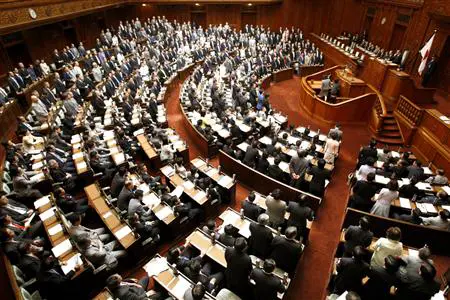Bipartisan lawmakers in Japan will convene on Tuesday and are widely expected to adopt a resolution protesting the Democratic People's Republic of Korea's (DPRK) launch of a long range rocket on Sunday.
Both ruling and opposition party representatives confirmed Monday that a plenary session of each of Japan's parliamentary caucuses will convene Tuesday to adopt the resolution.
Both political camps, including the ruling Liberal Democratic Party of Japan (LDP) and the main opposition Democratic Party of Japan (DPJ), have issued statements condemning the DPRK's launch as being in violation of UN Security Council resolutions, as well as its nuclear test last month as being a threat to global security.
Prime Minister Shinzo Abe is pushing for the government here to swiftly move to tighten sanctions on Pyongyang in the wake of the launch, possibly ahead of new punitive measures that might be adopted by the UN Security Council.
Japan has officially lodged a protest against the DPRK's launch of what it has said was an earth observation satellite, but believed by Japan and others to be a test of ballistic missile technology, through its diplomatic channels in Beijing.
The DPRK is banned from test-firing any rockets based on a ballistic missile technology under UN Security Council resolutions and such a test has not been conducted since 2012.
The government is mulling reinstating sanctions on Pyongyang, some of which were lifted in the summer of 2014, including banning senior officials of the pro-Pyongyang General Association of Korean Residents in Japan, (known also as Chongryon), from re-entering Japan after visiting the DPRK.
Additional punitive measures could involve remittances made to the DPRK from Japan that must be reported to the government here being returned to pre-sanction levels of 3 million yen (25,656 U.S. dollars) from 30 million yen (256,560 U.S. dollars). Government sources have said that the sanction could, however, be widened further.
Ahead of the plenary session to be held Tuesday, Japan's top government spokesperson, Yoshihide Suga, has said that investigation are ongoing into whether or not debris from the rocket fell into Japanese territory. While referring to the rocket and the possible satellite that was put into orbit as"objects, "Suga, while denouncing the launch, confirmed that there had been no reports of injury based on the launch or falling parts from the rocket as of early this morning.
Japan remains on high alert, however, and its battery of land and sea-based missile interceptors remain in place. Local experts confirmed Monday that the DPRK's rocket was likely a more powerful version than the Taepodong-2 ballistic missile that was fired in December 2012.
Local media quoted Daido University President Akira Sawaoka, an expert in space engineering, as saying that the timing of the stages of the rocket falling away, compared to previous launches, indicated the rocket had a more powerful engine and consumed more fuel than its predecessors.
Other experts have said that early investigations also suggest the rocket's payload has also been increased, which has added to the consternation of Japan's defense ministry.
Japan's Defense Minister Gen Nakatani said that investigations into the"nature of the rocket" were underway, in twine with South Korea and the United States.
Japan's Foreign Minister Fumio Kishida, meanwhile, in talks with officials in Seoul and Washington, has reiterated Japan's intentions to coordinate closely with its allies as UN Security Council talks evolve. Enditem
 简体中文
简体中文

